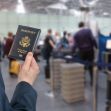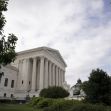The U.S. Supreme Court ruled this week in a unanimous vote that three Muslim men who were put on the no-fly list after they refused to act as informants can now officially sue federal agents for monetary damages.
The case of Tanzin v. Tanvir began when three Muslim men, Muhammad Tanvir, Jameel Algibhah, and Naveed Shinwari, were approached in separate incidences by FBI agent Tanzin who ask them to be informants. The agent wanted the men to spy against their community members, including other Muslims in the local mosque. According to the men, when they refused to act as informants, citing religious reasons, they were then put on a no-fly list as means of retaliation even though they were not suspected of any illegal activity and did not pose a threat to aviation.
The men all had wives or extended family overseas, and their status on the no-fly list inhibited them from visiting family in Pakistan and Afghanistan for upwards of four years. Additionally, the men lost job opportunities and hundreds of dollars on airline tickets they could not use or get reimbursement for. One defendant, Muhammad Tanvir, explained how the FBI agents tried to bribe him with money and immigration assistance to get his wife to America in exchange for his cooperation. Tanvir also alleges that he lost his long-haul trucking job because he could no longer fly home from one-way job routes.
The case took a turn when the men were notified that they were taken off of the no-fly list during a hearing, causing the federal judge to rule their case moot. The U.S. Court of Appeals for the 2nd Circuit overruled the federal judge's decision, stating that the men had grounds for damages under The Religious Freedom Restoration Act (RFRA).
Textual Interpretation of RFRA
The lawsuit was controversial in the fact that depending on the textual context of RFRA, it was unclear whether or not the men could sue agents of the government for monetary damages. Depending on how the law is interpreted, “appropriate relief” as stated in RFRA may not always qualify as something of monetary value.
RFRA has always acted as a sort of scrutiny test that takes into consideration whether or not a person's exercise of religion is violated or not. According to the law, the government may not burden a person's exercise of religion, and if it does, that individual is entitled to “appropriate relief.”
A unanimous 8-0 decision by the U.S. Supreme Court ruled that the three men were entitled to monetary damages as appropriate relief. Justice Clarence Thomas, who wrote the opinion, stated in reference to RFRA, “The question here is whether ‘appropriate relief’ includes claims for money damages against government officials in their individual capacities. We hold that it does.”
The Supreme Court's opinion goes on to say, “A damages remedy is not just ‘appropriate’ relief as viewed through the lens of suits against Government employees. It is also the only form of relief that can remedy some RFRA violations. For certain injuries, such as respondents’ wasted plane tickets, effective relief consists of damages, not an injunction.”
What makes the unanimous ruling in Tanzin v. Tanvir an interesting one is the possibility that federal agents can now be sued for monetary damages because of actions that stifle someone's religious beliefs. This potentially puts new pressure on federal agents investigating Americans, especially if federal agents are targeting individuals based on their religious beliefs.
Because of the intentional targeting of Muslim men in this case, there is the potential for similar lawsuits to come down the pipeline by other men who were targeted by FBI agents for religious reasons.
However, there is still a question about whether or not such cases will be successful. The doctrine of qualified immunity might still grant protections to federal agents if their actions took place within the boundaries of their duties. Of course, the issue of qualified immunity in general and whether or not it is time to retire that principle is something that has made national headlines throughout 2020.






